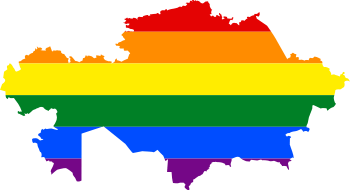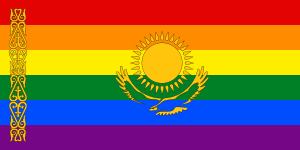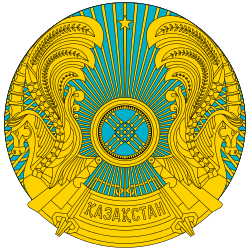LGBT rights in Kazakhstan
| LGBT rights in Kazakhstan | |
|---|---|
.svg.png) | |
| Same-sex sexual activity legal? | Legal since 1998[1] |
| Gender identity/expression | Transgender people allowed to change gender following surgery, medical examinations, hormone therapy and sterilization |
| Military service | No |
| Discrimination protections | No |
| Family rights | |
| Recognition of relationships | No |
Lesbian, gay, bisexual, and transgender (LGBT) persons in Kazakhstan face legal challenges and discrimination not experienced by non-LGBT residents. Both male and female same-sex sexual activity is legal in Kazakhstan, but same-sex couples and households headed by same-sex couples are not eligible for the same legal protections available to opposite-sex married couples.[1]
In 2009, Kazakhstan co-sponsored the opposing statement to the United Nations Declaration on Sexual Orientation and Gender Identity.
Legality of same-sex sexual activity

Both male and female same-sex sexual activity is legal in Kazakhstan since 1998.[1] The age of consent is 16.[2]
Prior to 1997, Article 104 of the Penal Code of Kazakhstan used to criminalize "buggery". This legislation followed the corresponding Section 121 from the former Soviet Union, which only specifically criminalized anal intercourse between men.[3]
Gender identity and expression
Since 2003, transgender individuals have been allowed to change their legal gender on their official identity documents in Kazakhstan. People who wanted to change their gender had to receive a diagnosis of "gender identity disorder" involving several medical tests and a 30-day psychiatric evaluation. In 2011, new guidelines were established and allowed change to identity documents only after sex reassignment surgery, physical and psychiatric medical examinations, hormone therapy and sterilization. Additionally, people under 21 are not allowed to change their gender on their official identity documents.[4][5]
Military service
LGBT people are banned from serving in the military.[6]
Propaganda bans
On 26 May 2015, the Constitutional Council of Kazakhstan declared a pending bill, which would ban the "propaganda of nontraditional sexual orientation", unconstitutional. The council rejected it because of its vague wording. The bill passed the Senate, Parliament's upper house, in February 2015 and was sent to President Nursultan Nazarbayev for signature. It had already been approved by the lower house.[7] Human Rights Watch said: "By rejecting this propaganda bill, Kazakhstan’s Constitutional Council set an important precedent against the adoption of discriminatory legislation."
Public opinion
In May 2015, PlanetRomeo, a LGBT social network, published its first Gay Happiness Index (GHI). Gay men from over 120 countries were asked about how they feel about society’s view on homosexuality, how do they experience the way they are treated by other people and how satisfied are they with their lives. Kazakhstan was ranked 118th, just above Ghana and below Burkina Faso, with a GHI score of 29.[8]
Living conditions
LGBT people in Kazakhstan face discrimination and prejudice on the grounds of their sexual orientation or gender identity during the course of their everyday lives. Manifestation of negative attitudes toward LGBT people, such as social exclusion, taunting, and violence often cause the victims physical, psychological and emotional harm. In order to avoid the dangers posed by people who do not approve of non-heterosexual sexual orientations, many LGBT people feel compelled to keep their sexual orientation or gender identity a secret from almost all people in their lives. The majority regard it as necessary to conceal their sexual orientation or gender identity from people in the workplace in order to retain their jobs and avoid hostility from bosses and co-workers. Attempts to report homophobic and transphobic violence to police are often met with resistance and even hostility on the part of law enforcement officers.[9]
A 2011 cross-national study by University of Chicago has demonstrated that a trend of LGBT acceptance is either slowed or reversed in Russia or other former USSR republics, a direct opposite of world trends.[10]
Summary table

| Same-sex sexual activity legal | |
| Equal age of consent | |
| Anti-discrimination laws in employment only | |
| Anti-discrimination laws in the provision of goods and services | |
| Anti-discrimination laws in all other areas (incl. indirect discrimination, hate speech) | |
| Same-sex marriages | |
| Recognition of same-sex couples | |
| Stepchild adoption by same-sex couples | |
| Joint adoption by same-sex couples | |
| LGBT people allowed to serve openly in the military | |
| Right to change legal gender | |
| Access to IVF for lesbians | |
| Commercial surrogacy for gay male couples | |
| MSMs allowed to donate blood |
See also
References
- 1 2 3 "State-sponsored Homophobia: A world survey of laws prohibiting same sex activity between consenting adults" (PDF).
- ↑ National Laws Legislation of Interpol – member states on sexual offences against children – Kazakhstan
- ↑ KAZAKHSTAN
- ↑ Violations by Kazakhstan of the Right of Transgender Persons to Legal Recognition of Gender Identity
- ↑ Kazakhstan: LGBT Community Living in Fear
- ↑ "Kazakhstan Says No to Gays in Military". Eurasianet. 13 June 2012. Retrieved 1 July 2012.
- ↑ Kazakhstan: Anti-Gay Laws Found Unconstitutional Human Rights Watch
- ↑ The Gay Happiness Index. The very first worldwide country ranking, based on the input of 115,000 gay men Planet Romeo
- ↑ Unacknowledged and Unprotected: Lesbian, Gay, Bisexual and Transgender People in Kazakhstan by Soros Foundation
- ↑ Cross-national Differences in Attitudes towards Homosexuality by NORC/University of Chicago
